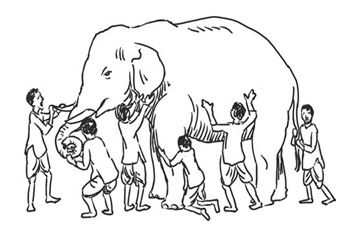I meant generally speaking, All Christians believe in God.
They all believe in
A god; It is far from clear that they all believe in
the same god.
Certainly they disagree about how god behaves, what god does, what god wants, or what (and whether) he demands.
The problem here, as usual, is one of definitions. Christians don't agree on what "god" is; Nor do they have a working definition of "life".
A working definition of anything allows people to take ANY example of a system, and assign it to one (and only one) of two (and only two) categories, by (and only by) the consistent application of the definition in question.
A working definition of Y says: "X is an example of a Y, if (and only if) X has
these features, and lacks
those features".
So a working definition of "mountain" might be, for example, "a piece of terrain is a mountain if, and only if, a part of it is above 300m altitude measured from local mean sea level". It doesn't matter if others don't agree that this is
the definition of a mountain; All that matters for a
working definition, is that it is not self contradictory, and that it can be applied to all
potential or
proposed mountains, and used to consistently and absolutely classify them as either "a mountain" or "not a mountain"; And that having done so, there are no objects left unclassifiable in our definition, and no objects that are obviously and/or widely agreed to be misclassified.
"Life" cannot currently be defined in this way. All definitions of "life" either leave some things in the "unclassified" bucket, or in the "obviously misclassified" bucket.
The same is also true of "god".
The widespread belief, amongst people of all religious traditions and none, that "life" and "alive" are words with sound working definitions, is the cause of vast amounts of pointless bickering.
Discussion of the origin of "life" is pointless and futile, without a definition of what "life" even
is. We don't have such a definition, and most people don't even realise it - it's "
obvious" and "
common sense" that the universe can be cleanly divided into "things that are alive" and "things that are NOT alive"; But sadly it's not
true.
Are viruses "life"? Are crystals? Can we clearly determine when an animal is "alive"? A recently dead donkey has many cells that are definitely donkey cells, and definitely living cells, but the donkey is definitely dead. How do we resolve these definite statements?
Such edge cases are generally ignored, but they erode the entire business of deciding what "life" even is. It's far too early to talk about how "life" began, when we don't even know what "life" is; Or what a "beginning" would even mean; Or whether it happened many times, or only once.
All we know for sure is that appealing to yet another poorly defined entity ("god") is the antithesis of helpful to any effort to understand "life".

